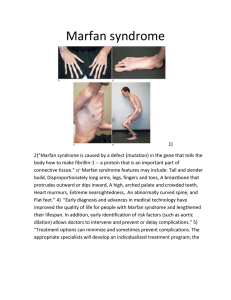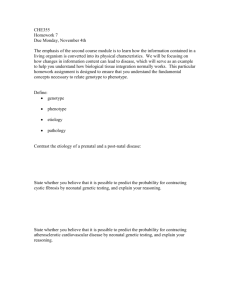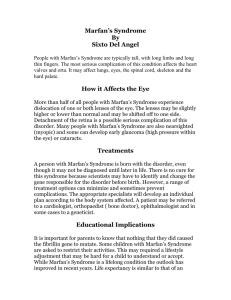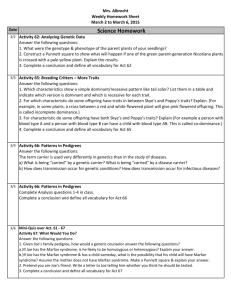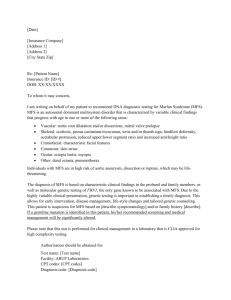Marfan Syndrome
advertisement
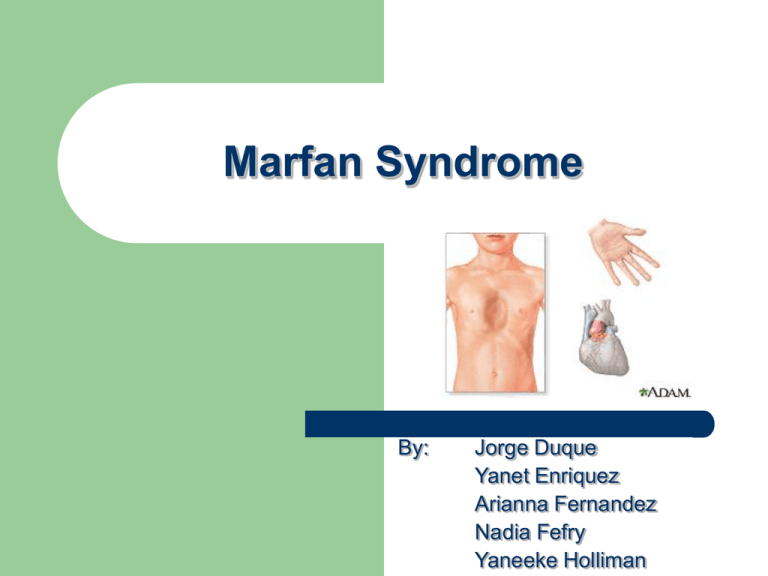
Marfan Syndrome By: Jorge Duque Yanet Enriquez Arianna Fernandez Nadia Fefry Yaneeke Holliman Answer to the Riddle John Ritter Actor. – Was in a show called Three's Company from 1977-1984. – In 1993, died from an aortic dissection caused by Marfan Syndrome. Rent – Play created by Jonathan Larson. – He died in 1996 from an aortic dissection caused by Marfan Syndrome. Abraham Lincoln – was believed to have Marfan Syndrome (long limbs). – Disease/Condition Named after Antoine Marfan in 1899. Marfan syndrome is an autosomal dominant genetic disorder of the connective tissue. The connective tissue is defective. It can affect many body systems, structures and organs including: – the skeleton, eyes, heart and blood vessels, nervous system, skin, lungs, the dural sac surrounding the spinal cord, and hard palate. It affects men, women, and children. Found among people of all races and ethnic backgrounds. 1 in 5,000 people in the United States have the disorder. Disorder progresses as the person ages. Characteristics/ Clinical Manifestation Unusually long limbs, great stature, or long toes (or fingers) in proportion to the person's height, Predisposition to cardiovascular disease. Characteristics/ Clinical Manifestation Cont. John Ritter and Jonathan Larson had problems associated with the cardiovascular system and both died from aortic dissection. – Most people with Marfan syndrome have problems associated with the cardiovascular system: the heart and blood vessels. The valve between the left chambers of the heart is defective and may be large and floppy. The valve may leak, creating a "heart murmur," Symptoms include shortness of breath, fatigue and palpitations (a very fast or irregular heart rate). The wall of the aorta may be weakened and stretch, a process called aortic dilation. Aortic dilation increases the risk that the aorta will tear (dissect) or rupture, causing serious heart problems or sometimes sudden death (aortic dissection). Characteristics/ Clinical Manifestation Cont. Abraham Lincoln was believed to have Marfan Syndrome due to problems associated with the Skeleton. – Typically, but not always, very tall or taller with slender and loose jointed. Affects the long bones of the skeleton. – Therefore the arms, legs, fingers, and toes may be disproportionately long in relation to the rest of the body – Long, narrow face, and the roof of the mouth may be arched, causing the teeth to be crowded. – Other skeletal abnormalities include a sternum (breastbone) that is either protruding or indented, curvature of the spine (scoliosis), and flat feet. Treatment Treatment options can minimize and sometimes prevent complications. Heart and blood vessels– – – – – – – Regular checkups and echocardiograms The earlier a potential problem is identified and treated, the lower the risk of life-threatening complications. Wear a medical alert bracelet and to go to the emergency room if they experience chest, back or abdominal pain. Drugs such as beta-blockers, Surgery Following heart surgery, extreme care must be followed to prevent endocarditis. Dentists should be alerted to this risk. Treatment (Cont.) Skeletal– – Annual evaluations are important to detect any changes in the spine or breastbone (sternum). In some cases, an orthopedic brace or surgery may be recommended. References Information retrieved from Google search using the key word “Marfan Syndrome” on May 14, 2007. Web Sites: – – – – – http://www.marfan.org/ http://www.allaboutarthritis.com/image/stock_image/marfan _syndrome02.jpg http://www.medstudents.com.br/original/revisao/marfan/marf an.jpg http://www.google.com/search?source=ig&hl=en&q=marfan +syndrome http://en.wikipedia.org/wiki/Marfan_syndrome

